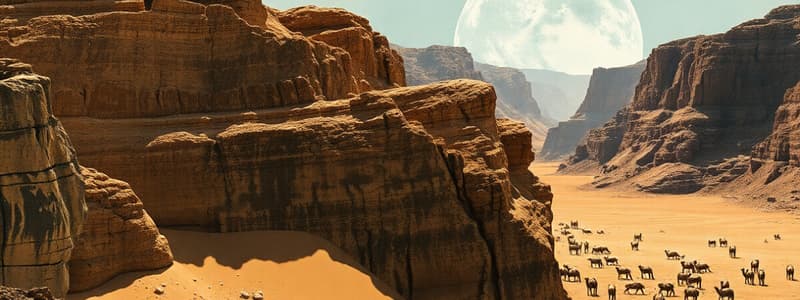Podcast
Questions and Answers
A polar climate receives a significant amount of heat from solar radiation due to the angle of the Sun's rays.
A polar climate receives a significant amount of heat from solar radiation due to the angle of the Sun's rays.
False (B)
The variation in the angle of the Sun's rays is a key factor in determining different climate zones on Earth.
The variation in the angle of the Sun's rays is a key factor in determining different climate zones on Earth.
True (A)
Deserts are characterized by a significant presence of water and lush vegetation.
Deserts are characterized by a significant presence of water and lush vegetation.
False (B)
In polar regions, the growing season is often extended due to longer daylight hours.
In polar regions, the growing season is often extended due to longer daylight hours.
The factors influencing climate include elevation and the biosphere, among others.
The factors influencing climate include elevation and the biosphere, among others.
Flashcards
Polar Climate
Polar Climate
Polar regions receive less solar radiation due to a shallow angle of the sun's rays, resulting in limited daylight hours and harsh conditions for life.
Desert Climate
Desert Climate
A desert is a region with extremely low rainfall, less than 10 inches per year, and characterized by hot temperatures, scarce vegetation, and arid conditions.
Solar Radiation and Climate Zones
Solar Radiation and Climate Zones
The angle of the sun's rays hitting the Earth's surface determines different climate zones. The angle is larger at the equator and smaller at the poles, leading to significant temperature variations.
Climate
Climate
Signup and view all the flashcards
Factors Influencing Climate
Factors Influencing Climate
Signup and view all the flashcards
Study Notes
Desert Climate in Wadi Rum, Jordan
- Wadi Rum, Jordan lacks water.
- Deserts do not have water.
Cold Climate
- Polar regions receive less solar heat because the angle of the sun's rays is very low to the ground.
- The Earth's axis affects how long the day is, causing large variations in daylight hours.
- Vegetation is limited to a few months due to the harsh conditions.
- Life in polar regions is difficult.
Climatic Zone Advantages
- Not specified, but implied in the image.
Siberian Baikal Lake
- Rocks are frozen in the ice.
- Main characteristics not specified.
- Location: Siberia.
Climate Zones
- The angle of the sun's rays impacting the Earth's surface determines climate zones.
- The equator receives the most direct sunlight, creating a warm climate.
- The poles receive less direct sunlight and thus have colder climates.
- Climate zones are crucial for understanding weather patterns.
Studying That Suits You
Use AI to generate personalized quizzes and flashcards to suit your learning preferences.




